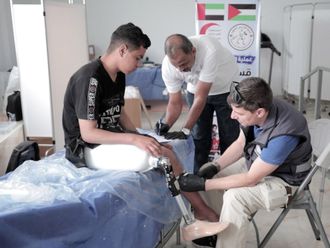
One in every eight woman can be diagnosed with breast cancer, and taking prudent measures like early detection as well as risk management help in the mitigation of the disease.
Each year, October is marked as Breast Cancer Awareness month with the aim to increase awareness about the disease and its prevention. As research conducted worldwide suggests, breast cancer is the most common cancer affecting women across the globe, and early detection is vital to reduce the mortality and morbidity from the disease. Hence, women in their 20s are recommended to regularly examine their breasts after periods, followed by undergoing a clinical breast examination every six months to a year in your 30s, while those in their 40s are advised to undergo a clinical breast examination as well as a regular mammogram (an X-ray test) on a regular basis.
One of the most important question posed here is: Can this risk be reduced? Yes, there are plenty of preventive measures such as maintaining normal weight and exercising, eating lots of fruits and vegetables, avoiding processed foods and reducing red meat consumption, in addition to avoiding alcohol and smoking being some of the important steps. Having children before the age of 35 and breastfeeding can have a protective effect against breast cancer. Prolonged use of combined contraceptives and hormone replacement therapy should be avoided too. These measures will reduce the risk by 20-40 per cent but not completely eliminate the risk of breast cancer, hence screening and early detection is the best way to ensure better survival and reduced morbidity.
At the Thumbay University Hospital, women present commonly to the gynecology department for breast checkups, either for routine screening or if they have noted any abnormality. After conducting a detailed clinical evaluation, they are advised the suitable screening or diagnostic modality based upon the findings, patient’s age and risk factors; whether they need breast ultrasound, mammography or MRI. More so, if any suspicious lesion is detected, either on clinical examination or by scanning, the patient is referred for surgical evaluation to have a biopsy and plan her treatment. If the biopsy turns out to be cancer, they are referred to an oncologist.
In addition, if someone is undergoing a treatment, there are some dos and don’ts that they need to follow to make a quick recovery. To begin with, it focuses solely in helping the patient mentally cope with the diagnosis, because receiving such news is usually very hard on the patient and family — who need all the support and guidance at the time to be able to move on with the treatment plan. The patient and family often need psychological support and counselling to manage the feeling of denial, anger and depression associated with cancer diagnosis and manage relationship issues caused by the stress and disturbed self-image. Many misconceptions need to be cleared about the impact of surgery, chemo or radiotherapy, when some may not be willing to proceed with them.
— Dr Abddelaziz is the Clinical Lecturer and Head of Obstetrics and Gynecology, Thumbay University Hospital














